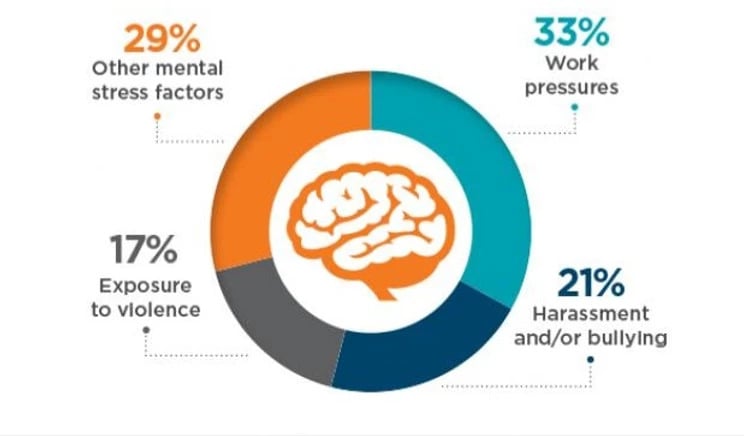Post
Kleu
- Apr 10
Covid-19 impact on Workplace Mental Health in Australia

Mental ill-health has been a major concern for Australia well before the current Covid-19 crisis. A draft report published by the Australian Government Productivity Commission in October 2019 [1] estimated the cost to the economy to be $181bn per year: $43-51bn in direct cost and $130bn representing the opportunity cost of diminished health and reduced life expectancy. We can only expect this to increase in the current environment.
From a business perspective, the cost to Australian businesses is estimated at $12.8bn per year, mainly due to absenteeism, reduced productivity and compensation claims. And given that 60% employees [2] still don’t feel comfortable talking about mental health challenges at work, the real cost is likely to be much higher. According to Allianz Australia, 40% of workers compensations claims have been attributed to mental health [3] and 92% of serious mental health worker’s compensation claims are due to work-related stress [4].
Infographic from Safe Work Australia
There is no doubt Covid-19 is going to have a significant impact on workplace mental health. Frontline employees serving the community during this time are at most risk of both physical and mental health injuries. However, the toll of transitioning ‘non-essential’ employees into work from home arrangements poses an additional set of risks associated with isolation and sub-par working conditions, in context of carer’s responsibilities, relationship strain and financial distress.
SafeWork Australia’s list of the psychosocial hazards that may be associated with Australia’s response to Covid-19 includes exposure to customer aggression, increased work demand and poor organizational change management.
https://www.safeworkaustralia.gov.au/covid-19-information-workplaces/mental-health-and-covid-19
Historically, workplace mental health initiatives have focused on providing important education in relation to identifying and responding to workplace mental health situations, with a focus on providing quality treatment options to employees in crisis situations. Employee Assistance Programs (EAPs) enable employees to access valuable professional help when they need it and are often very helpful. However, typically these programs are only deployed after a problem has surfaced. They are remedial, rather than preventative in nature and it seems fair to say that we should expect a shortage of experts in this area in the near future.
So, what can we as leaders do to minimize the impact of the current situation on our employees?
-
Ask – acknowledge the current situation and instead of asking ‘how are you?’ ask ‘how are you feeling?’ to shift the conversation to an emotional level and determine what people are really feeling. After all, feelings drive thinking, behaviour and performance.
-
Connect – human beings need connection; genuine, authentic ‘moments’ of resonance. Set up a buddy system between employees who are coping with the situation differently, so they can share perspectives and support each other.
-
Empathize – share the emotional experience your people are having and don’t try to fix what isn’t yours to fix. Being able to share your own experience is much more powerful than trying to offer solutions that are theoretical at best.
By far, the most important thing we can do as leaders is to Empower our people- give our employees the tools to manage the complex emotional landscape of the current situation themselves. Your own ‘emotional tank’ will quickly deplete if you are trying to prop up your people. The skills to navigate the emotional aspect of this situation; identifying and engaging with the myriad of emotions we are all feeling; vulnerability, confusion and uncertainty, is something we can all learn.
To learn more about how Kleu can empower your people to navigate this challenge and apply the human skills that matter, click here.
[1] Australian Government Productivity Commission, Mental Health, Draft Report, Oct 19
[2] HBR, 'People Want their Employers to talk about Mental Health', Oct 19
[3] Allianz Insurance, January, 2019
[4] Safework Australia, February, 2019
Share Link





